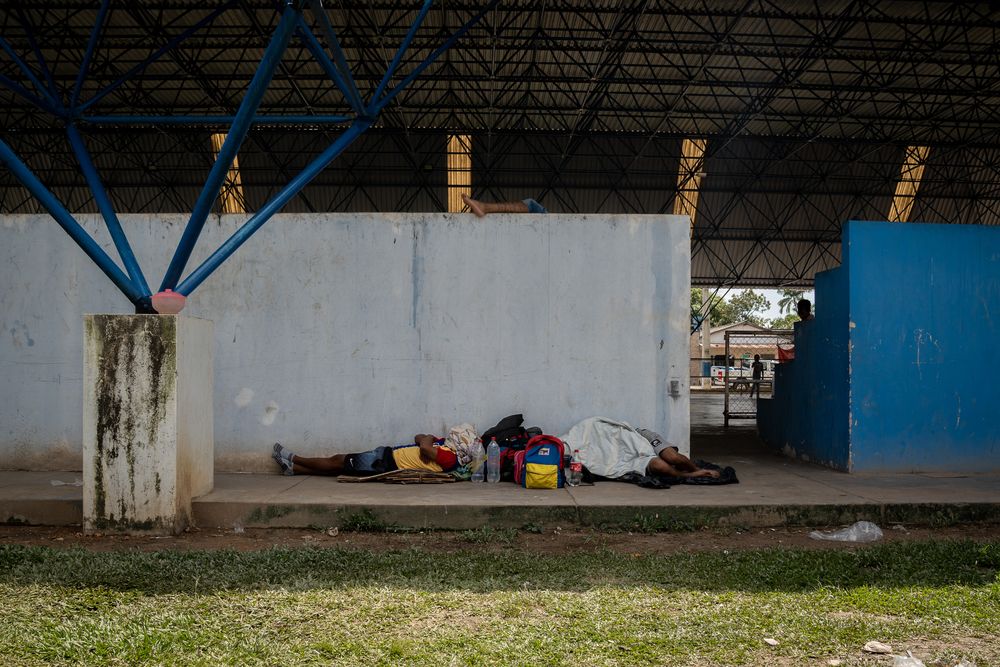"What I carry with me"
The struggles of Venezuelan migrants and refugees in northern Brazil

Daily, around 500 migrants and asylum seekers cross the Venezuelan border to Pacaraima, Brazil.
Meanwhile, the migration registration system is only processing 65 people a day.
Due to limited resources, most of them are forced to live on the streets.




Wilfredo
Wilfredo hitchhiked to the Brazilian border with his wife, three daughters and three grandchildren.
“I carry with me memories of the peaceful life I once had in Venezuela. To remember those times, I always have this cap with me. It's from my baseball team, the Leones."
"In Venezuela I’d always been a waiter, but then I could no longer find a job and, when I did, the salary wasn’t enough to feed my family. "

"Every time the kids woke up, they'd ask for breakfast and there wasn't anything to give them. How do you tell them that? If they had breakfast, they didn't have lunch; if they had lunch, they didn't have dinner; and if they had dinner, they didn't have breakfast. "
"Here it hasn't been easy, but sometimes you have to eat fruit while they're still green so that one day you'll eat them ripe again. "
"The decision to leave was mainly for the children, so that they would have a future. You have to make the effort for the children. I dream of being able to work, have a calmer life and see my grandchildren grow up too."
Victor and Alejandro
Víctor and Alejandro are both 19 and were neighbours in Venezuela. It took them two days to hitchhike to the Brazilian border.
“We dream of opening up a business, even if it's a small one. Our families didn't want us to come, but young people in Venezuela can't get good jobs. "

"If you get a job here, you can pay your rent."
"Our mums cried and said it would be very hard, and yes, it is, but we want to get our papers and move on. It's not easy sleeping on the floor, but it's by trying over and over again that you find a way.”
María Helena and Domingo
“Domingo is a lawyer and a pastor and I’m a seamstress. We carry with us the knowledge of those professions and our love for our children. "
"A lot of families in Venezuela have looked for a way to survive and, when they migrate, they have to separate. That's very sad."
"We have three children. Two are in Rio Grande do Sul and the eldest, the 39-year-old, went to Bogotá, in Colombia, but he had a stroke there and died. Looking for a better life, looking for a better life, he left with his family but all he found was death."

"And I, his mother, couldn't be there with him. In the end, he was in bed for seven months and I couldn't go. We haven't seen our other children for two years now."
"Maybe if we were still all together, at home, my son would still be alive. That's not something easy to get over.”
María Helena suffers from very high blood pressure and has had two strokes in the past. She and Domingo live in Pacaraima and receive medical and psychological care from MSF.




Mírvida and Fátima
“We brought with us our hairdressing knowledge. We had a business in Venezuela, but eventually the cost of hair dyes and other supplies was just too high, so we sold the salon and came here with our children."
"Now we are selling coffee and snacks until we get another job."

"We are trying to open another salon. "
"We are a little scared because we don't know the language very well to speak with clients, but we are going to learn, we are going to make it."
Leidimar
“I carry with me my love of cooking. Here in Pacaraima I sell cake and ice cream. Before, in Venezuela, I had my own business where I sold fruit and natural juices, as well as worked as a catering assistant."

"I love Venezuela, but we can't live there now. What I miss most is the family being together. I left my eldest son there and I also have family living in Colombia and Peru now."
Leidimar arrived in Brazil accompanied by some of her children and a niece.
Kerwin, Layana and Camila
“We came here with almost no possessions. We left with just the clothes we were wearing. We sold everything we had."

"Our dream is for our daughter to study – and us too, perhaps – and to build a house and have a home. We want to be citizens."
Alejandra*
"I brought my sewing machine with me so that I can work in Brazil. I studied education, I'm a teacher, but I sew to earn money here. "
"I have five children altogether. The oldest ones are in Porto Velho and I'm here with the smallest one, a boy, as well as my 16-year-old daughter and her two-year-old son. "
"I recently paid for an express car to rescue my daughter from an abusive partner in Venezuela. The partner mistreated her and would have killed her if she didn't leave."

"When I got here, I was sleeping on the floor, on a cardboard box, but even so it’s better here than in Venezuela. In Venezuela a litre of oil costs US$10 and a packet of rice costs US$4. Everything is in dollars now. I would get my salary, immediately pay off all the debts I’d run up the month before to buy us food, and by the end of the day I’d have nothing again. "
"My husband came to Brazil first, and sometimes he would send me money from here, 50 reals, and all I could buy was a packet of rice and a packet of flour. My youngest son was malnourished when we finally arrived in Brazil."
*Name has been changed to protect confidentiality.




